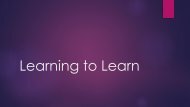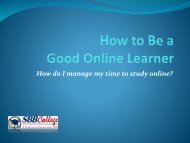Student Success Section 1 - Learning To Learn (1)
You also want an ePaper? Increase the reach of your titles
YUMPU automatically turns print PDFs into web optimized ePapers that Google loves.
<strong><strong>Learn</strong>ing</strong> to <strong>Learn</strong>
<strong><strong>Learn</strong>ing</strong>:<br />
A relatively permanent change in<br />
knowledge or behavior that comes<br />
about as a result of your experiences.
“Your Perception is your Reality”<br />
<br />
<br />
Drawing conclusions without all appropriate information hinders our<br />
ability to learn<br />
Perceptual Cues: Rules that guide your understanding of the world<br />
Understanding your perceptual cues will help you understand how you<br />
see the world<br />
MORE IMPORTAT: Understanding how OTHERS see the world will help you<br />
learn and work successfully with more groups of people<br />
<strong>Success</strong>ful people ASK QUESTIONS before drawing<br />
conclusions
Processing How You <strong>Learn</strong><br />
<br />
<strong>To</strong>p-down processing: From the cortex down<br />
“Aoccdrnig to rscheearch at Cmabrigde Uinervtisy, it deosn’t mttaer in waht oredr<br />
the ltteers in a wrod are, the olny iprmoetnt tihng is taht the frist and lsat ltteer be at the<br />
rghit pclae. The rset can be a toatl mses and you can sitll raed it wouthit porbelm. Tihs is<br />
bcuseae the huamn mnid deos not raed ervey lteter by istlef, but the wrod as a wlohe.”<br />
<br />
Bottom-up processing: From the senses up to your brain.
Multiple Intelligences<br />
Intelligence<br />
Linguistic Intelligence<br />
Logical-Mathematical Intelligence<br />
Visuospatial Intelligence<br />
Musical Intelligence<br />
Bodily-Kinesthetic Intelligence<br />
Interpersonal Intelligence<br />
Study Tip<br />
Record yourself reading aloud and<br />
play the recording back as you study<br />
Organize the chapter and notes into a<br />
logical flow that makes sense to you<br />
Drawing or doodling a representation<br />
of the information that needs to be<br />
understood<br />
Listen to music as you study or create<br />
musical jingles of key concepts<br />
Study while doing a physically activity<br />
that you enjoy<br />
Try keeping a brief journal of your<br />
reactions (thoughts and feelings) to<br />
chapter section(s)
Multiple Intelligences Continued…<br />
Intelligence<br />
Naturalistic Intelligence<br />
Existential Intelligence<br />
Study Tip<br />
Study in physical locations that are<br />
representative of the course material<br />
Pose questions of content that explore what<br />
lies beyond life and death such as why are<br />
people born, how do they get here and why<br />
do they die
Emotional Intelligence…Book Smart<br />
versus Street Smart!<br />
<br />
Emotional intelligence involves the abilities to:<br />
read others’ emotions accurately<br />
respond to others’ emotions appropriately<br />
motivate oneself<br />
be aware of one’s own emotions<br />
regulate and control one’s own emotional responses<br />
High Emotional Intelligence = higher employability and<br />
increased longevity in your career!
Motivation to <strong>Learn</strong><br />
Intrinsic Motivation<br />
Motivated by personal<br />
INTERNAL desire to learn<br />
more about a subject or<br />
skill<br />
Extrinsic Motivation<br />
Motivated by EXTERNAL<br />
factors like praise from<br />
teachers/friends or higher<br />
grades
















